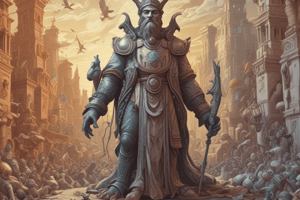Podcast
Questions and Answers
शक्ति का क्या अर्थ है?
शक्ति का क्या अर्थ है?
सर्वोच्च, पूर्ण अधिकार का क्या अर्थ है?
सर्वोच्च, पूर्ण अधिकार का क्या अर्थ है?
राजनीतिक संस्कृति का क्या अर्थ है?
राजनीतिक संस्कृति का क्या अर्थ है?
राजनीतिक सिद्धांत किससे संबंधित है?
राजनीतिक सिद्धांत किससे संबंधित है?
Signup and view all the answers
सार्वजनिक नीति किस ओर ध्यान केंद्रित करती है?
सार्वजनिक नीति किस ओर ध्यान केंद्रित करती है?
Signup and view all the answers
कौन सा प्रणाली उन सरकारी संरचनाओं को दर्शाता है जिसमें नागरिकों को निर्णय लेने में भाग लेने का अधिकार होता है?
कौन सा प्रणाली उन सरकारी संरचनाओं को दर्शाता है जिसमें नागरिकों को निर्णय लेने में भाग लेने का अधिकार होता है?
Signup and view all the answers
राजनीतिक भागीदारी के किस रूप को नागरिकों द्वारा उनके विचार व्यक्त करने और परिवर्तन की मांग करने के लिए मान्यता प्राप्त है?
राजनीतिक भागीदारी के किस रूप को नागरिकों द्वारा उनके विचार व्यक्त करने और परिवर्तन की मांग करने के लिए मान्यता प्राप्त है?
Signup and view all the answers
कौन सा राजनीतिक सिद्धांत शक्ति के गतिशीलता और राजनीतिक प्रणालियों पर एक विशेष दृष्टिकोण देता है?
कौन सा राजनीतिक सिद्धांत शक्ति के गतिशीलता और राजनीतिक प्रणालियों पर एक विशेष दृष्टिकोण देता है?
Signup and view all the answers
कौन सा तत्व सामाजिक आंदोलनों को परिभाषित करता है?
कौन सा तत्व सामाजिक आंदोलनों को परिभाषित करता है?
Signup and view all the answers
कौन सा प्रणाली अत्यधिक केंद्रीकृत अधिनायकवाद का एक रूप है जिसमें समाज के सभी पहलुओं पर नियंत्रण होता है?
कौन सा प्रणाली अत्यधिक केंद्रीकृत अधिनायकवाद का एक रूप है जिसमें समाज के सभी पहलुओं पर नियंत्रण होता है?
Signup and view all the answers
Study Notes
- Political science studies politics, power, and government, examining political systems, institutions, and actors.
Key Concepts
-
Power: Influence over others to achieve outcomes, often coercion or persuasion. Forms include authority, influence, and coercion.
-
Authority: Legitimate power based on norms, rules, or traditions.
-
Legitimacy: A government's perceived morality and justification by the people.
-
Sovereignty: A state's supreme, absolute authority within its own territory, implying independence.
-
Ideology: Belief systems shaping political understanding and action. Examples include liberalism, conservatism, socialism, and fascism.
-
Political Culture: Shared values, beliefs, and norms regarding politics within a society, influencing participation and actor behavior.
-
Political Institutions: Formal organizations (legislatures, executives, judiciaries) structuring political activity and policy.
-
Political Behavior: Individual and group actions/attitudes in the political arena, including voting, participation, and public opinion.
Branches of Political Science
-
Comparative Politics: Studies political systems across countries for similarities, differences, and theories of development and change.
-
International Relations: Focuses on state interactions, including diplomacy, war, peace, international law, and organizations.
-
Political Theory: Explores fundamental political concepts, justice, rights, and the state, often drawing on philosophy.
-
Public Policy: Examines policymaking processes, implementation, and evaluation.
Methods and Approaches in Political Science
-
Quantitative Methods: Statistical analysis, surveys, and mathematical tools to measure political phenomena.
-
Qualitative Methods: Interviews, archival research, case studies, to deeply understand political contexts.
-
Formal Modeling: Mathematical and logical tools to model political processes and outcomes.
Key Figures and Schools of Thought
- Various schools of thought (e.g., pluralism, elite theory, Marxism) offer differing perspectives on power dynamics and political systems, with specific theoretical foundations.
Key Political Systems
-
Democracy: Citizen participation in decision-making, often through elections.
-
Authoritarianism: Power concentrated in one person or group, limiting individual rights.
-
Totalitarianism: Highly centralized authoritarianism, controlling all aspects of society through propaganda and repression.
Political Participation
-
Voting: A fundamental form of political participation.
-
Protests and Demonstrations: Citizens expressing views, demanding change.
-
Campaigning: Activities to influence elections.
Political Issues and Challenges
-
Political corruption: Misuse of public office for personal gain.
-
Inequality: Disparities in wealth, power, and access to resources.
-
Social movements: Groups organizing around common causes for social or political change.
-
Globalization: Increased interconnectedness of countries through trade, technology, and exchange.
-
Political instability: Periods of uncertainty and conflict.
Governance and Administration
- Systems and procedures for governing, including institutional frameworks and processes, with assessments of administrative effectiveness.
Contemporary Challenges in Political Science
-
Analyzing threats to democracy and the rise of populism.
-
Examining the effects of social media and technology on political communication.
-
Understanding the growing complexity of international relations.
Studying That Suits You
Use AI to generate personalized quizzes and flashcards to suit your learning preferences.
Description
इस क्विज़ में राजनीति विज्ञान के मूलभूत सिद्धांतों की जांच की जाएगी, जिसमें शक्ति, प्राधिकार, और वैधता शामिल हैं। हम राजनीतिक संस्कृति और विचारधाराओं की भी चर्चा करेंगे, ताकि आप राजनीति के विभिन पहलुओं को समझ सकें।




